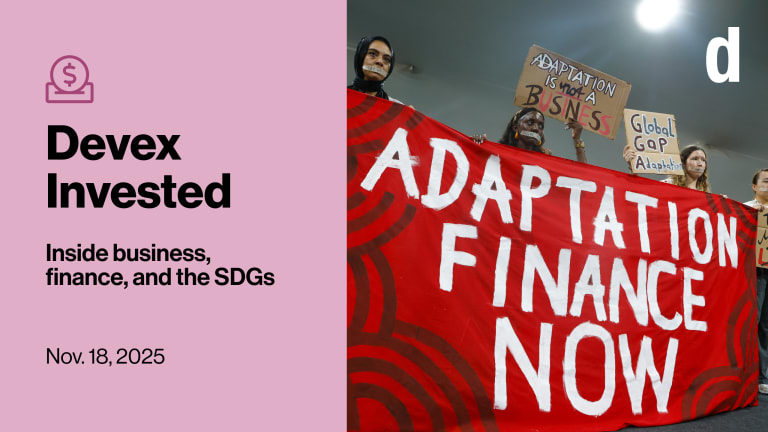
The agenda for the United Nations’ annual Financing for Development Forum this month will look familiar to those who have taken part before. That got me thinking about what's actually new in this year’s discussions.
So I checked in with Navid Hanif, the director of the sustainable development financing office at the U.N. Department of Economic and Social Affairs, which helps coordinate the forum. In his assessment, little progress has been made on the Addis Ababa Action Agenda since it was adopted in 2015. But the pandemic and the war in Ukraine have “reinforced the need to deal with structural flaws we have been postponing for a long time,” Hanif tells me, and conversations to address those issues are gaining momentum.
Will this year’s forum prompt action? That’s still up in the air.
• The “Financing for Sustainable Development Report 2022,” out Tuesday, outlines the stark financial divide between high- and low-income countries — which can threaten global stability, Hanif says. The report also says the divide may be exacerbated by global political tensions, rising inflation, and the high risk of existing debt distress, as well as the war in Ukraine and its impact on commodity prices.
This is a preview of Devex Invested
Sign up to this weekly newsletter inside business, finance, and the SDGs, in your inbox every Tuesday.
• The report makes three recommendations: Global leaders and organizations must address financing gaps and rising debt risks, align financing flows with sustainable development, and improve transparency so that countries can better manage risks and effectively use resources.
• An expected outcome document from the 2022 forum is likely to reiterate many of the positions agreed in previous years, particularly around tax, trade, and anti-corruption efforts, along with economic and aid issues, according to Eric LeCompte, the executive director at Jubilee USA Network.
• But a draft of the document has a few notable additions, he tells me. The final version is likely to recommend an international summit on development financing in 2024. And the draft has stronger language on debt — saying, for example, that the G-20’s Common Framework for debt treatments should move quickly, with a clear process that includes a debt standstill during negotiations. It also calls for a more comprehensive debt solution and for small island developing states to gain access to concessional finance, particularly through IMF.
• Another key issue in the document relates to changing how assessments are made by credit rating agencies, which play a significant role in sovereign funding and addressing mounting indebtedness. Hanif says what’s needed is longer-term thinking in credit ratings, which could help decrease borrowing costs for lower-income countries. And ratings agencies now seem willing to engage, he says.
ICYMI: Debt crisis worsens in poor countries, but no sign G-20 in a hurry (Pro)
+ A Devex Pro subscription brings you essential analysis, data-driven funding insights, and access to the world’s largest global development job board. Get these perks and more by signing up to our 15-day free trial.
Corporate retreat
Over 600
—That’s how many companies have withdrawn from Russia in the wake of its attack on Ukraine. Who’s on the list? The Yale School of Management is keeping track.
Will RST come to be?
IMF’s board is due to meet Wednesday to consider approval of the Resilience and Sustainability Trust, a mechanism designed to support long-term growth and development across a broad range of countries, including middle-income nations. Initially, the RST is set to focus on climate change and pandemic preparedness support.
"We can’t prejudge the outcome of the vote. But based on conversations, we are optimistic," says Vimal Thakoor, an IMF economist who has worked on the issue. Once approved, the RST will have to be operationalized. IMF intends to consider applications from countries seeking support by the end of the year, and it aims to raise $30 billion initially and an additional $20 billion over time.
The trust’s size will depend on donors, including big players such as the United States. Current budget talks in Washington indicate that the country will not be allocating anything to the RST — for now.
Market links
The Central American Bank for Economic Integration is focused on strengthening infrastructure as part of its strategy to increase access to the U.S. market for regional farmers, CABEI Executive President Dante Mossi tells my colleague Teresa Welsh.
“Now is the time for the regional bank to make a difference, because the voices in Washington are somehow a bit far from where the action is. That’s the advantage we have over big boys,” Mossi says.
Read: CABEI chief outlines strategy to boost Central American farm exports (Pro)
Full disclosure
The new International Sustainability Standards Board has published its first proposals for global guidelines on corporate sustainability disclosures. The draft requirements, which outline what an entity will need to disclose about all significant sustainability-related risks, are an effort to create a global set of metrics. The draft rules are open for public comment through the end of July.
ISSB has also revealed plans to build on the standards of the Sustainability Accounting Standards Board and to embed SASB’s industry-based standards development approach into its own processes.
What we’re reading
A peace funding advocate urges more giving for Ukraine and other conflicts. [Devex]
How a Tesla-backed startup made cheap power a debt burden for the world’s poorest. [Bloomberg]
Kenyan mobile money gets a boost in the shift to seamless payments. [Bloomberg]
Canadian banks have doubled their financing of highly polluting oil sands despite joining a U.N. climate initiative. [Financial Times]
Shabtai Gold contributed to this edition of Devex Invested.









